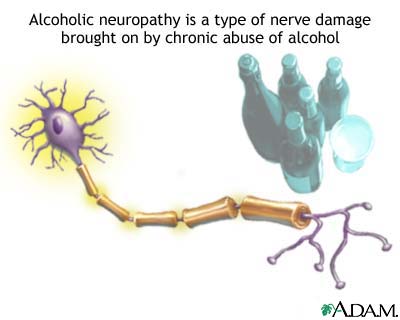Treatment
Once the immediate alcohol problem has been addressed, treatment goals include:
* Controlling symptoms
* Maximizing ability to function independently
* Preventing injury
It is important to supplement the diet with vitamins, including thiamine and folic acid.

Physical therapy and orthopedic appliances (such as splints) may be needed to maximize muscle function and maintain limb position.
Patients may take medication, if necessary, to treat pain or uncomfortable sensations. The response to medications varies. Patients are advised to take the least amount of medication needed to reduce symptoms, to help prevent drug dependence and other side effects of chronic use.
Common medications may include over-the-counter analgesics such as aspirin, ibuprofen, or acetaminophen to reduce pain. Tricyclic antidepressants or anticonvulsant medications such as phenytoin, gabapentin, or carbamazepine may help stabbing pains.
Positioning, or the use of a bed frame that keeps the covers off the legs, may reduce pain for some people.
Some people may need to treat blood pressure problems, difficulty with urination, and slow gastrointestinal movement.
Light-headedness or dizziness when standing up (orthostatic hypotension) may require several different treatments before you find one that successfully reduces symptoms. Treatments that may help include:
* Wearing elastic stockings
* Eating extra salt
* Sleeping with the head elevated
* Using medications such as fludrocortisone
Bladder dysfunction may be treated with:
* Manual expression of urine
* Intermittent catheterization
* Medications such as bethanechol
Impotence, diarrhea, constipation, or other symptoms are treated when necessary. These symptoms often respond poorly to treatment in people with alcoholic neuropathy.
It is important to protect body parts with reduced sensation from injury. This may include:
* Checking the temperature of bath water to prevent burns
* Changing footwear
* Frequently inspecting the feet and shoes to reduce injury caused by pressure or objects in the shoes
* Guarding the extremities to prevent injury from pressure
Stop using alcohol to prevent the damage from getting worse. Treatment for alcoholism may include psychiatric therapy social support such as Alcoholics Anonymous (AA), medications, and behavior modification.
Prognosis (Expectations)
Damage to nerves from alcoholic neuropathy is usually permanent and may get worse if you continue to use alcohol or do not correct nutritional problems. Symptoms vary from mild discomfort to severe disability. The disorder is usually not life-threatening, but it may severely affect your quality of life.
Complications
* Disability
* Long-term (chronic) discomfort or pain
* Injury to extremities
Calling Your Health Care Provider
Call for an appointment with your health care provider if you have symptoms of alcoholic neuropathy.
Alcoholic neuropathy: Overview, Causes
Alcoholic neuropathy: Symptoms & Signs, Diagnosis & Tests
Alcoholic neuropathy: Treatment
Reviewed By : David C. Dugdale, III, MD, Professor of Medicine, Division of General Medicine, Department of Medicine, University of Washington School of Medicine; and Daniel B. Hoch, MD, Assistant Professor of Neurology, Harvard Medical School, Department of Neurology, Massachusetts General Hospital. Also reviewed by David Zieve, MD, MHA, Medical Director, A.D.A.M., Inc.
